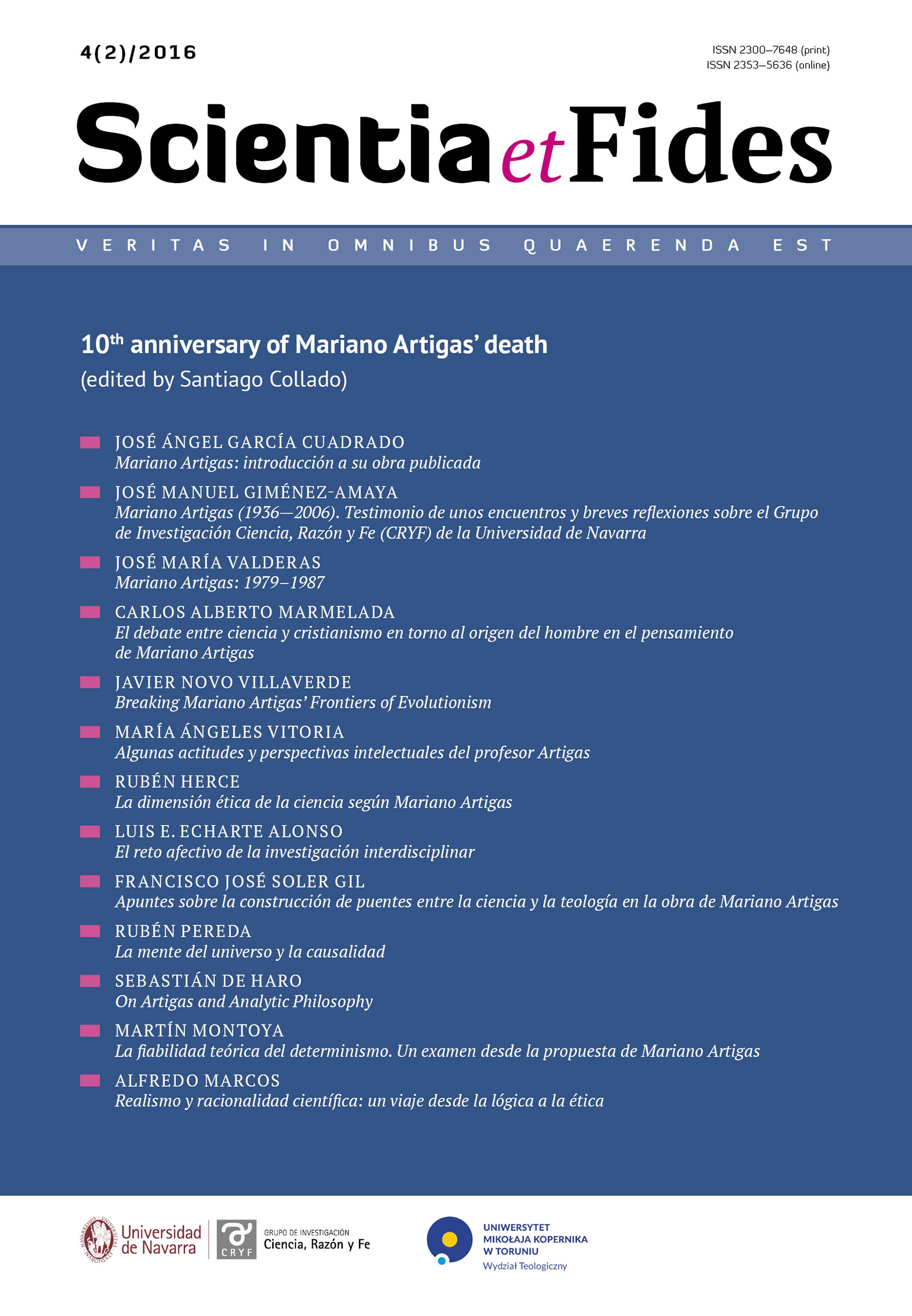Realismo y racionalidad científica: un viaje desde la lógica a la ética
Słowa kluczowe
critical rationality, scientific realism, Artigas, Duhem, PopperAbstrakt
Realism and scientific rationality: A journey from logic to ethics
Mariano Artigas’s relationship with the work and person of Karl Popper went through three phases. The first one ends with Artigas’s book entitled Karl Popper: búsqueda sin término (1979). Artigas found in Popper a powerful source of inspiration. But he also stated several discrepancies with Popper, especially in regard to the thesis of the conjectural nature of knowledge. However, Artigas saw the possibility of a fruitful dialogue with Popper. The second phase begins with the correspondence between Artigas and Popper, and culminates with the publication by Artigas of a book entitled El desafío de la racionalidad (1994). Here, some affinities and differences appear in regard to the theory of rationality of both authors. The third phase was opened precisely in 1994, with the reading by Artigas of several Popperians hitherto unpublished texts. These texts revealed themselves crucial to the understanding of the Popper’s position on the problem of rationality. It became clear that the Popperian idea of critical rationality has its support and inspiration more in the field of ethics than in the domain of logic. This finding left open a path of greater proximity and sympathy between them, as it is stated in Artigas’ book Lógica y ética en Karl Popper (1998); a path that, for biographical reasons, they were unable to travel together, but that represents a challenging invitation for today’s philosophers.
Bibliografia
Artigas, M. 1979. Karl Popper: búsqueda sin término. Madrid: Editorial Magisterio Español.
Artigas, M. 1988. Prólogo a Pierre Duhem: La filosofía de la ciencia en sus orígenes por. M. Artigas, 11-17. Barcelona: PPU.
Artigas, M. 1989. Filosofía de la ciencia experimental. Pamplona: Eunsa.
Artigas, M. 1992. La inteligibilidad de la naturaleza. Pamplona: Eunsa.
Artigas, M. 1994. El desafío de la racionalidad. Pamplona: Eunsa.
Artigas, M. 1998. Lógica y ética en Karl Popper. Pamplona: Eunsa.
Artigas, M. 1999. “Lógica y ética en Karl Popper”, seminario impartido el 13 de enero de 1999 en el Grupo de Estudios Peirceanos de la Universidad de Navarra (accesible en http://www.unav.es/gep/AF69/AF69Artigas.html).
Chillón, 2015. “¿Popper aristotélico? Logos, crítica y sociedad abierta”. Daimon. Revista Internacional de Filosofía 65: 147-162.
Marcos, A. 1988. Pierre Duhem: La filosofía de la ciencia en sus orígenes. Barcelona: PPU, (con prólogo de Mariano Artigas).
Marcos, A. 2012. Postmodern Aristotle. Newcastle: Cambridge Scholars Publishing.
Peirce, Ch. S. 1955. “The Scientific Attitude and Fallibilism”. En Philosophical Writings of Peirce, editado por J. Buchler, 42-59. Nueva York: Dover.
Popper, K. 1961. La miseria del historicismo. Madrid: Taurus.
Popper, K. 1973. La lógica de la investigación científica. Madrid: Tecnos.
Popper, K. 1974. “Replies to my Critics”. En The Philosophy of Karl Popper, editado por P. A. Schilpp 964–1197. Chicago: Open Court.
Popper, K. 1977. Búsqueda sin término: una autobiografía intelectual. Madrid: Tecnos.
Popper, K. 1994. La sociedad abierta y sus enemigos. Barcelona: Paidós.
Putnam, H. 1988. Razón, verdad e historia. Madrid: Tecnos.
Pobrania
Opublikowane
Jak cytować
Numer
Dział
Licencja
CC BY ND 4.0. Posiadaczem prawa autorskiego (Licencjodawcą) jest Autor, który na mocy umowy licencyjnej udziela nieodpłatnie prawa do eksploatacji dzieła na polach wskazanych w umowie.
- Licencjodawca udziela Licencjobiorcy licencji niewyłącznej na korzystanie z Utworu/przedmiotu prawa pokrewnego w następujących polach eksploatacji: a) utrwalanie Utworu/przedmiotu prawa pokrewnego; b) reprodukowanie (zwielokrotnienie) Utworu/przedmiotu prawa pokrewnego drukiem i techniką cyfrową (e-book, audiobook); c) wprowadzania do obrotu egzemplarzy zwielokrotnionego Utworu/przedmiotu prawa pokrewnego; d) wprowadzenie Utworu/przedmiotu prawa pokrewnego do pamięci komputera; e) rozpowszechnianie utworu w wersji elektronicznej w formule open access na licencji Creative Commons (CC BY-ND 3.0) poprzez platformę cyfrową Wydawnictwa Naukowego UMK oraz repozytorium UMK.
- Korzystanie przez Licencjobiorcę z utrwalonego Utworu ww. polach nie jest ograniczone czasowo ilościowo i terytorialnie.
- Licencjodawca udziela Licencjobiorcy licencji do Utworu/przedmiotu prawa pokrewnego nieodpłatnie na czas nieokreślony
PEŁEN TEKST UMOWY LICENCYJNEJ >>
Statystyki
Liczba wyświetleń i pobrań: 598
Liczba cytowań: 0



